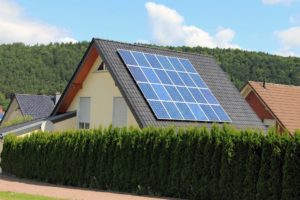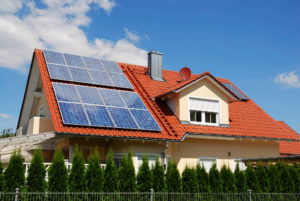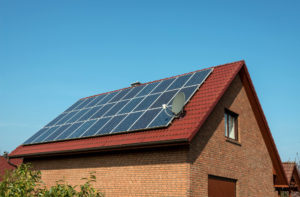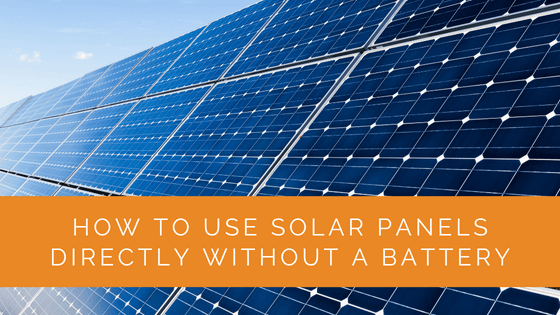Readily available and renewable – This is how you can conveniently define the energy extracted through solar panels. With the growing reliance on clean sources of power generators, the demand for solar power systems is growing daily.
Solar panels are the most efficient choice if you are exploring energy-saving options for everyday use. With the combined engineering of solar cells, an inverter, an electrical panel, and a power grid, you can keep your houses illuminated even during critical power outages.
You can further slim the initial investment costs by not equipping the structure with big battery banks or inverters. Interesting.
Here’s all you need to know to convert your energy-saving apparatus into an even more cost-friendly one!
Contents
- 1 Key Takeaways
- 2 How Does a Solar Power System Work?
- 3 What are the Different Types of Solar Systems Without Batteries You Can Use?
- 4 When Should You Use a Solar Panel System Without a Battery?
- 5 Case Study: Solar Panel Installation Without Battery Storage
- 6 Expert Insights From Our Solar Panel Installers About Using Solar Panels Directly without A Battery
- 7 Experience Solar Excellence with Us!
- 8 In a Nutshell
Key Takeaways
- Solar panel systems can generate electricity directly without a battery, making them cost-effective for areas with adequate sunlight.
- Electricity can be obtained directly from solar panels for devices that run on direct current (DC) or by using a solar inverter to convert DC into alternating current (AC) for standard appliances.
- Grid-tied or hybrid solar systems allow excess energy to be stored on the local utility grid, providing backup power and the potential for earning energy credits through net energy metering (NEM). Batteries are unnecessary in settings with a reliable power grid or where grid-tied systems are accessible.
How Does a Solar Power System Work?
To harness solar energy, the panel apparatus parts work together to convert the absorbed rays into usable current.
The photovoltaic cells are grouped during solar panel installation to absorb the maximum insolation falling on them. The panel structure generates a direct current (DC) through the interplay of negatively and positively charged ions. At this point, the solar inverter’s role comes into the picture.
Since house gadgets work on alternating current (AC), the generated power through the solar-powered structure must be converted from DC into AC through an inverter. The main reason for conversion is the stability of the voltage for a steady power source.
After conversion, the battery banks attached to the inverter collect the energy. These batteries act as an energy backup system for utilization during power outages or when panels are gaining momentum to produce electricity.
The good news is that you can utilize solar panel systems as your reliable electricity generator without a solar battery in the entire apparatus.

What are the Different Types of Solar Systems Without Batteries You Can Use?
With revolutionary advancement and optimization of the available resources, solar panel systems are cost-friendly power generators for areas with adequate insolation.
Interestingly, the solar panels’ costs associated with these systems have decreased in the last decade. Installation of solar panels without a battery is immensely beneficial for further reducing the overall solar system setup and maintenance costs.
You can receive electricity through power generator cells and solar inverters only through:
- Directly operating or charging devices that run on direct current, such as HVAC systems through panel setup without battery systems
- Utilization of solar energy through the installation of a solar inverter to convert DC into AC
- Extracting energy through grid-tied systems while connecting solar panels without a battery at home

Direct Operation Through Incoming Solar Energy
There are two types of solar panels without batteries that you can use to supply electricity.
One way to avail energy through solar panel systems is by picking electronic appliances that run on direct current only. In this manner, you are not required to transform the produced electricity into the typically usable form, i.e., alternating current.
Since the power is sourced directly from the panels, you might face trouble with electricity during overcast weather and power outages. Additionally, since there’s no battery storage, the initial hours of electricity production can be blackout hours at home.
The other way to receive electricity through cleaner means is by installing a solar inverter in the panel set up to convert DC into AC. Establishing an off-grid solar system enables homeowners to operate all appliances without looking for a DC-compatible device. In addition, it also enables uniform voltage spread across all the devices to regulate power fluctuations.

Employment of Grid-Tied or Hybrid Systems
The grid-tied or hybrid solar system allows the storage of excess energy produced on a local utility grid. These local systems are a collection of battery banks and the grid internet that offers electricity when production is at a halt.
It is helpful in the event of a power failure and storing extra energy produced. It is beneficial for running cleaner and greener electricity and provides a way to earn credits based on net energy metering (NEM).
NEM allows solar panel users to collect excess energy created during high-insolation months to be utilized later. It works as a giant battery backup that rewards the surplus suppliers with credits to use against an equal amount of energy provided to the grid.
When Should You Use a Solar Panel System Without a Battery?
While panels with batteries are a full package deal to begin your clean energy journey, not all settings require a backup.
A battery backup system installation at home isn’t required when:
- You live in an urban area with a reliable power grid
- You reside in an extreme natural disaster-safe region
- The grid-tied hybrid system is easily accessible from your residential location
- You are not bothered by random power outages
- You find acquiring energy from a general pool comprising fossil fuel-based sources convenient
Case Study: Solar Panel Installation Without Battery Storage
Background
The Sloan family, living in Lexington, Kentucky, decided to switch to solar energy to reduce their environmental footprint and lower their electricity bills. They were particularly interested in a cost-effective solution that did not involve battery storage.
Project Planning and Objectives
The main objectives for the Sloan family were:
- Reduce upfront costs by avoiding battery storage
- Maximize energy efficiency and savings
- Utilize solar power to decrease dependence on the local utility grid
- Ensure a reliable power supply even without batteries
They consulted with Solar Panels Network USA to explore their options and design a suitable system.
Installation and Costs
After a detailed assessment, a 5kW grid-tied solar panel system was recommended. The cost breakdown included:
- High-Efficiency Solar Panels: $10,000
- Installation: $2,500
- Solar Inverter: $1,500
- Permits and Inspections: $1,000
- Total Estimated Cost: $15,000
Financial Incentives:
- Federal Tax Credit (ITC): $4,500
- State Rebates: $1,500
- Adjusted Total Cost: $9,000
Installation Process
The installation process was completed over three days and included the following steps:
- Site Assessment: Evaluating the roof’s condition, orientation, and shading to determine the optimal placement for the panels.
- Panel Installation: Mounting 16 high-efficiency solar panels on the south-facing roof to maximize sunlight exposure.
- System Integration: Installing a solar inverter to convert DC to AC and connecting the system to the local utility grid.
- Inspection and Activation: Conducting a final inspection and activating the system to ensure optimal performance.
Results and Benefits
The Sloan family’s solar power system now generates approximately 600 kWh per month, covering a significant portion of their energy needs and reducing their reliance on the grid. The grid-tied system allows them to feed excess energy back into the grid, earning credits through net metering.
Environmental and Financial Impact:
- Annual Savings: $1,200
- Payback Period: ~7.5 years
- Reduced CO2 Emissions: ~3.0 metric tons annually
- Enhanced Energy Independence: The family experiences fewer disruptions and significant reductions in energy costs.
Summary
The Sloan family’s experience in Lexington, Kentucky, highlights the effectiveness of using solar panels without battery storage. By opting for a grid-tied system, they reduced their upfront costs and still achieved substantial energy savings and environmental benefits. Solar Panels Network USA provided expert guidance and seamless installation, ensuring the system met all the family’s needs. This case study illustrates how homeowners can successfully transition to solar energy without the additional expense of battery storage, while still enjoying reliable and sustainable power.
Expert Insights From Our Solar Panel Installers About Using Solar Panels Directly without A Battery
Using solar panels without a battery can significantly reduce initial setup costs. By integrating a solar inverter, you can convert the DC power to AC, making it suitable for most household appliances.
Grid-tied systems are an excellent choice for those looking to harness solar energy without the need for battery storage. These systems allow you to feed excess energy back into the grid and earn credits through net metering.
Directly using solar energy for DC-compatible devices is a practical approach in areas with consistent sunlight. However, for more reliable energy access, integrating an inverter or using a grid-tied system is advisable.
Experience Solar Excellence with Us!
Trust in Solar Panels Network USA, where our seasoned experts deliver top-quality solar solutions for homes and businesses nationwide. With a legacy of countless successful installations and a commitment to sustainable energy, we’re your reliable partner in the solar journey. Ready for a brighter, eco-friendly future? Call us now at (855) 427-0058 and harness the sun’s power!
In a Nutshell
The main reason for using batteries in solar power systems is the requirement for electricity storage.
Excess power accumulation helps with the availability of electricity during emergencies such as natural disasters, cloudy weather, etc. However, installing a solar battery at home isn’t the only way to make the best use of generated energy through solar power.
Usually, homeowners can do away with the battery setup if they have appliances that run on direct current. However, it is only helpful during the daytime as the extracted energy is not stored for immediate supply.
In addition, a no-battery solar panel setup is conveniently possible by outsourcing the storage requirement to a grid-based hybrid solar system. Doing this will save you additional installation costs and enhance your carbon footprint score by routing surplus to the utility grid.
About the Author
Solar Panels Network USA stands at the forefront of solar energy solutions, driven by a team of seasoned solar engineers and energy consultants. With over decades of experience in delivering high-quality solar installations and maintenance, we are committed to promoting sustainable energy through customer-centric, tailored solutions. Our articles reflect this commitment, crafted collaboratively by experts to provide accurate, up-to-date insights into solar technology, ensuring our readers are well-informed and empowered in their solar energy decisions.

